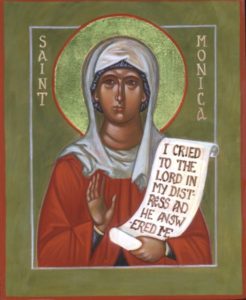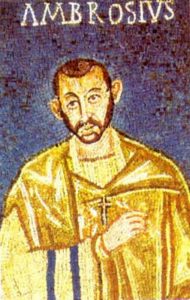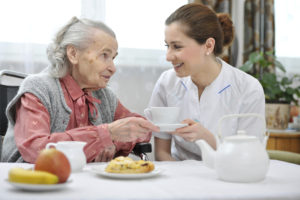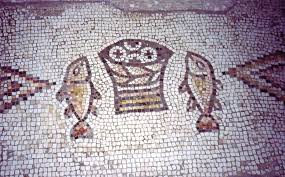 Lately, I find myself as fascinated by Saint Monica as by her famous son. I’m planning on doing some more reading and research on her, and posting more about her in the near future. But, meanwhile, here are the basics of what is know of her biography.
Lately, I find myself as fascinated by Saint Monica as by her famous son. I’m planning on doing some more reading and research on her, and posting more about her in the near future. But, meanwhile, here are the basics of what is know of her biography.
Almost everything that we know about Saint Monica comes from Saint Augustine’s description of his mother in his Confessions. He says she was “in her 56th year” when she died in 387, and her birth date is variously reported as 331, 332 and 333. She was somewhere between age 20 and 22 when she married Augustine’s father Patricius – a curiously late marriage in an era when girls were betrothed as early as age 7 and married at an average age of 16.
Monica was a devout Christian at the time of her marriage. By Augustine’s account, her Christian faith was influenced as much by an elderly family servant as by her parents. Patricius was a pagan, a philanderer, and a man easily aroused to rage. His mother, who lived with the couple until her death, was a gossip who shared her son’s hot temper. In Augustine’s telling, Monica bore her husband’s and her mother-in-law’s wrath so patiently that she earned their respect. Her mother-in-law eventually became her defender against the servants’ and neighbors’ gossip (it would be interesting to know what they were gossiping about, but on that her son is silent). And, her husband never beat her, which was apparently an unusual situation in the 4th century.
Monica’s two younger children, Navigus and Perpetua, never gave her a moment’s trouble that we hear about. Aurelius Augustine was another matter. Monica wanted him for the Church, but he continually disappointed her by choosing rowdy boys as companions, turning to Manicheism rather than Christianity and, of course, by taking a lower-class mistress in Carthage. When her heart was breaking over Augustine’s Manicheism, Monica had a dream in which a beautiful young man assured her, “Where you are, he will be.” Like many early Christians, Monica believed that dreams foretold the future and was reassured.
There are intriguing signs that her family background may have been Donatist. The Donatists were a Christian sect, later vigorously resisted by Augustine, who revered the martyrs of the Diocletan persecution and refused to reconcile with anyone who had compromised during the persecution. They fasted on Saturday nights and took food to the graves of the revered dead. Both are habits that that Augustine describes Monica as practicing. When Monica followed her son to Milan in 385, she befriended the Bishop of Milan, the future Saint Ambrose, and expressed to him her puzzlement about differences between North African and Italian religious practices. This was the occasion of the famous quote by Saint Ambrose that is often abbreviated to “When in Rome, do as the Romans do.”
Monica is revered by Christians for having “prayed” her son into the Church. When she followed him to Milan, he had already rejected Manicheism and was a neo-Platonist professor of rhetoric who often read the Christian Bible. Augustine’s friendship with Ambrose, facilitated by Monica, is often credited as final step in bringing him to the Church.
Augustine and Monica spent two more years in Milan, along with Augustine’s son Adeodonatus, and some friends. In the fall of 387, they traveled to Ostia, to find passage back to North Africa. There, Monica caught a fever and died on November 13, 387, her son’s 33rd birthday. Shortly before her illness, she and Augustine discussed the afterlife and he quotes her as saying, “One thing there was for which I desired to linger for a while in this life, that I might see thee a Catholic Christian before I died.” This faithful, patient mother saw her wish granted more abundantly than she could have imagined. Her wayward son became a Father of the Church and devoted the second half of Book IX of his Confessions to describing her virtue, her death and his grief.
 Promise me that you’ll do at least one of the following this week:
Promise me that you’ll do at least one of the following this week:
 Our pastor’s sermon last Sunday was on the topic of Christian friendship, and that made me think of Saint Augustine’s experience of friendship.
Our pastor’s sermon last Sunday was on the topic of Christian friendship, and that made me think of Saint Augustine’s experience of friendship. Do you enjoy singing hymns in church? Then thank Saint Ambrose; he is generally credited with introducing hymnody into the Western church from the East. And that was only one of his many accomplishments.
Do you enjoy singing hymns in church? Then thank Saint Ambrose; he is generally credited with introducing hymnody into the Western church from the East. And that was only one of his many accomplishments.
 When
When